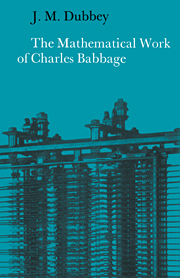Book contents
- Frontmatter
- Contents
- Preface
- 1 Introduction
- 2 British mathematics 1800–30
- 3 The Analytical Society
- 4 The calculus of functions
- 5 ‘The Philosophy of Analysis’
- 6 Miscellaneous papers in analysis, probability and geometry
- 7 Notation
- 8 Babbage and his computers
- 9 Conclusion
- Appendix: mathematical books and papers by Charles Babbage
- Index
5 - ‘The Philosophy of Analysis’
Published online by Cambridge University Press: 22 December 2009
- Frontmatter
- Contents
- Preface
- 1 Introduction
- 2 British mathematics 1800–30
- 3 The Analytical Society
- 4 The calculus of functions
- 5 ‘The Philosophy of Analysis’
- 6 Miscellaneous papers in analysis, probability and geometry
- 7 Notation
- 8 Babbage and his computers
- 9 Conclusion
- Appendix: mathematical books and papers by Charles Babbage
- Index
Summary
‘The Philosophy of Analysis’ is the title of a set of mathematical essays by Charles Babbage, only one of which was ever published. The remainder are bound together and kept in the British Museum Manuscripts Room as Additional Manuscripts 37202.
It is difficult to determine why these essays of generally high quality and much original thought should have been so neglected by Babbage. If published as a book, which would have been his first one, they would no doubt have had a considerable influence on mathematical thought. Round about the year 1830 was one of the most fruitful periods in the history of mathematics, when revolutionary ideas in algebra and geometry were first put forward and the era of modern mathematics could be said to have begun. Two, in particular, of Babbage's papers would have made a major contribution both to the type of algebra generally known as ‘modern’, to distinguish it from symbolised arithmetic, and to stochastic analysis.
Babbage makes no reference to this proposed work in his Passages from the Life of a Philosopher, or in any other of his writings. We can learn of the fate of this work only from a few letters from his friends. E. F. Bromhead, writing on 7 March 1821, is most enthusiastic:
I am glad you continue to work at the Philosophical Theory of Analysis, I have always considered Notation as the Grammar of symbolic language, which can have its false concord, barbarisms, and bad style, as well as any tongue descended from the dispersion of Babel.[…]
Information
- Type
- Chapter
- Information
- The Mathematical Work of Charles Babbage , pp. 93 - 130Publisher: Cambridge University PressPrint publication year: 1978
